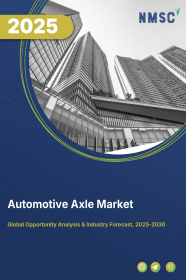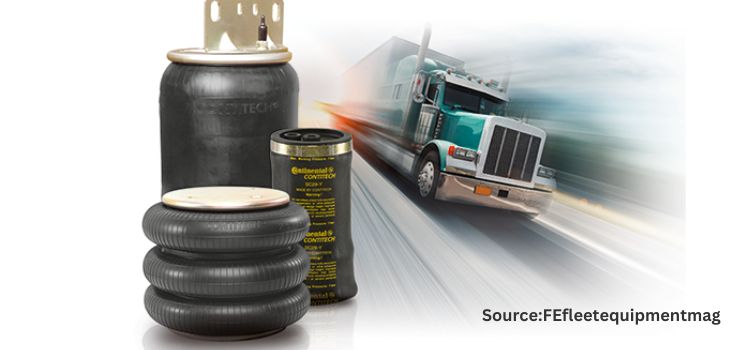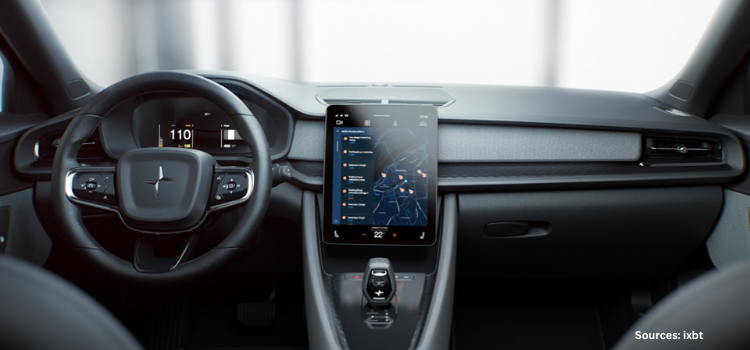
Automotive Axle Market by Material (Alloy, Carbon Fibre, and Others), by Type (Drive Axle, Dead Axle, and Lift Axle), by Application (Front Automotive Axle, Rear Automotive Axle, and Stub Automotive Axle), and by Vehicle Type (Passenger Vehicles, Commercial Vehicles, and Electric Vehicles) – Global Opportunity Analysis and Industry Forecast 2025-2030
US Tariff Impact on Automotive Axle Market
Trump Tariffs Are Reshaping Global Business
Automotive Axle Market Overview
The global Automotive Axle Market was valued at USD 40.81 billion in 2024 and is predicted to reach USD 50.17 billion by 2030 with a CAGR of 3.5% from 2025-2030.
The market is driven by factor such as surge in automobile sales, increasing per-capita income and rapid urbanisation. Additionally, few notable players such as ZF Friedrichshafen AG, GKN Automotive and Schaeffler are adopting various business tactics such as product launches to maintain their dominance in the market.
The market is however hindered by the high manufacturing cost. On the other hand, the adoption of monobloc CV axle tube technology is anticipated to create ample future opportunities.
Surge in Automobile Sales Drives Market Growth
The surge in automobile sales significantly amplifies the demand for axles which are crucial for the mobility of vehicles and their ability to bear loads. The uptick in electric and hybrid vehicles necessitates innovative and resilient axle systems.
For example, the International Energy Agency reports that, in Europe, electric vehicle sales skyrocketed by over 15%—with more than one out of every five cars sold being electric in 2022. Meanwhile China’s electric vehicle sales jumped from 1.9 million to 2.7 million units in 2023. This trajectory also shows how fast the country's electric car market is growing as the demand for green modes of transport increase; ultimately benefitting the automotive axle industry as a result.
Increasing Per-Capita Income Fuels the Automotive Axle Market Growth
Increasing per-capita income of the population is a significant growth factor and escalates vehicle demand that leads to new and replacement axles sales. Shoppers often choose premium vehicles that come fitted with state-of-the-art axle assemblies. Therefore, more disposable income raises the demand for better axle technology while also promoting the growth of the automotive axle sector.
Canada's disposable income will rise from USD 46,720 in 2022 to USD 51,549 in 2030 representing a 10.3% increase over 7 years. China's disposable income of USD 10,529 (2022) has been projected by International Energy Outlook to reach USD 15,484 (+47% fast over 7 years) by 2030.
Rapid Urbanisation Bolster the Automotive Axle Market Demand
Rapid urbanization leads to increased population density, driving a greater need for both personal and public transportation. The increasing mobility demands underpin the growth of the market, as production of vehicles accelerates to support this. As per the World Bank Group, the trend of global urbanization increased exponentially from 2013 to 2023, rising from 3.82 billion to 4.6 billion people an unprecedented growth of 20% from 2013-2023.
High Manufacturing Cost Hinders Automotive Axle Market Expansion
The high manufacturing costs hinder the growth of the industry due to disrupted supply chain, material shortages and production delays obstructs the market growth.
Adoption of Monobloc CV Axle Tube Technology Creates Future Opportunities
The adoption of monobloc CV axle tube technology strengthens the automotive axle industry by improving durability, drivetrain efficiency, and reducing NVH. It is used in luxury vehicles and heavy-duty trucks, it also lowers maintenance and extends component life, creating future market opportunities.
Market Segmentation and Scope of Study
The automotive axle market report is categorised on the basis of material, type, application, vehicle type, and region. On the basis of material, the market is divided into alloy, carbon fibre, and others. On the basis of type, the market is grouped into drive axle, dead axle, and lift axle. On the basis of application, the market is divided into front automotive axle, rear automotive axle, and stub automotive axle. On the basis of vehicle type, the market is divided into passenger vehicles, commercial vehicles, and electric vehicles. Regional breakdown and analysis of each of the aforesaid segments includes regions comprising of North America, Europe, Asia-Pacific, and RoW.
Geographical Analysis
Presently, Asia-Pacific dominates the global automotive axle market share and it is expected to remain the biggest market during entire forecast period. This is due to factors such as advances in automotive industry by the leading automotive manufacturing centers such as China, Japan, South Korea and India in vehicle orders and also sales.
As per the Society of Indian Automobile Manufacturers (SIAM) report, production of vehicles in India rose 13% between April 2022-March 2023.
Industry produced 25,931,867 vehicles during the year, compared with 23,040,066 units in April 2021 and March 2022. This number comprises of passenger vehicles, commercial vehicles, and others that demonstrates India’s strong presence as a global automotive manufacturing hub and contributing to the growth of automotive axle industry.
Moreover, the significant vehicle demand from urbanization and the economic growth of developing countries such as India, China, and Indonesia, among others are expected to drive the market.
As reported by World Bank Group, the urban population of China has reached 910.8 million in 2023 as compared to 2013 which stands at 722.6 million in 2013, with a growth of 26% from 2013-2023.
As per World Bank Group data, China's urban population trend in 2023 is 910.8 million from 722.6 million from 2013, with 26% growth from 2013-2023. The demand for convenient and quick transport solutions increases the demand for personal cars and light vehicles, which fuels the sales of automotive axles systems.
Conversely, the market in North America is anticipated to propel at the fastest growth rate due to increasing demand for luxury vehicles. This growth fuels the requirement for axles with improved strength, accuracy, and reduced noise and vibrations. Only the highest level of axle designs are able to meet luxury performance requirements found with advanced features such as adaptive suspension and high-torque engines.
In January 2023, luxury vehicles made up 19.6% of U.S. car sales, breaking December's record, according to the Cox Automotive. Luxury cars, which are focused on performance and comfort, have experienced an increase in demand, thereby helping boost automotive axle industry growth.
Furthermore, the rise of electric vehicles in North America boosts the automotive axle industry. As EVs become more popular, the need for advanced axles that can support high-performance powertrains and longer battery ranges increases. Government incentives and better charging infrastructure help drive this demand.
According to the U.S. Department of Transportation 2024, the U.S. government announced USD 521 million in grants to add over 9,200 EV charging ports across 29 states, eight federally recognized tribes and the District of Columbia fuels national EV infrastructure.
Competitive Landscape
The automotive axle industry is comprised of several market players that includes American Axle & Manufacturing, Inc., Dana Limited, GNA Axles, ZF Friedrichshafen AG, GKN Automotive Limited, Robert Bosch GmbH, BorgWarner Inc., Talbros Axles, Automotive Axles Limited, Schaeffler AG, Automotive Axles Limited (AAL), Hyundai WIA Corporation, NTN Corporation, Spicer Parts, and TrakMotive among others. These manufacturers are actively engaging in product launch across various regions to maintain their dominance in the market.
In May 2023, ZF Friedrichshafen AG unveiled the AxTrax 2 (a next-gen modular and integrated axle-based e-powertrain system) for commercial vehicles. This system replaces traditional parts such as the engine and transmission, improving vehicle design and efficiency.
In March 2023, GKN Automotive opened a Dallas-Fort Worth warehouse for better delivery of aftermarket products.
In June 2022, Schaeffler launched the e-axle, the first intelligent rear axle system for electric vehicles. This system combines advanced drive components with a compact control system. Although this innovation improves performance, it also boosts efficiency through features such as adaptive torque distribution and a regenerative braking system.
Key Benefits
-
The report provides quantitative analysis and estimations of the automotive axle industry from 2025 to 2030, which assists in identifying the prevailing market opportunities.
-
The study comprises a deep-dive analysis of the current and future automotive axle market trends to depict prevalent investment pockets in the market.
-
Information related to key drivers, restraints, and opportunities and their impact on the automotive axle industry is provided in the report.
-
Competitive analysis of the key players, along with their market share is provided in the report.
-
SWOT analysis and Porters Five Forces model is elaborated in the study.
-
Value chain analysis in the market study provides a clear picture of roles of stakeholders.
Automotive Axle Market Key Segments
By Material
-
Alloy
-
Carbon Fibre
-
Others
By Type
-
Drive Axle
-
Dead Axle
-
Lift Axle
By Application
-
Front Automotive Axle
-
Rear Automotive Axle
-
Stub Automotive Axle
By Vehicle Type
-
Passenger Vehicles
-
Commercial Vehicles
-
Electric Vehicles
By Region
-
North America
-
The U.S.
-
Canada
-
Mexico
-
-
Europe
-
The UK
-
Germany
-
France
-
Italy
-
Spain
-
Denmark
-
Netherlands
-
Finland
-
Sweden
-
Norway
-
Russia
-
Rest of Europe
-
-
Asia-Pacific
-
China
-
Japan
-
India
-
South Korea
-
Australia
-
Indonesia
-
Singapore
-
Taiwan
-
Thailand
-
Rest of Asia Pacific
-
-
RoW
-
Latin America
-
Middle East
-
Africa
-
Key Players
-
American Axle & Manufacturing, Inc.
-
Dana Limited
-
GNA Axles
-
ZF Friedrichshafen AG
-
GKN Automotive Limited
-
Robert Bosch GmbH
-
BorgWarner Inc.
-
Talbros Axles
-
Automotive Axles Limited.
-
Schaeffler AG
-
Automotive Axles Limited (AAL)
-
Hyundai WIA Corporation
-
NTN Corporation
-
Spicer Parts
-
TrakMotive
REPORT SCOPE AND SEGMENTATION:
|
Parameters |
Details |
|
Market Size in 2024 |
USD 40.81 Billion |
|
Revenue Forecast in 2030 |
USD 50.17 Billion |
|
Growth Rate |
CAGR of 3.5% from 2025 to 2030 |
|
Analysis Period |
2024–2030 |
|
Base Year Considered |
2024 |
|
Forecast Period |
2025–2030 |
|
Market Size Estimation |
Billion (USD) |
|
Growth Factors |
|
|
Countries Covered |
28 |
|
Companies Profiled |
15 |
|
Market Share |
Available for 10 companies |
|
Customization Scope |
Free customization (equivalent up to 80 working hours of analysts) after purchase. Addition or alteration to country, regional, and segment scope. |
|
Pricing and Purchase Options |
Avail customized purchase options to meet your exact research needs. |

















 Speak to Our Analyst
Speak to Our Analyst





















